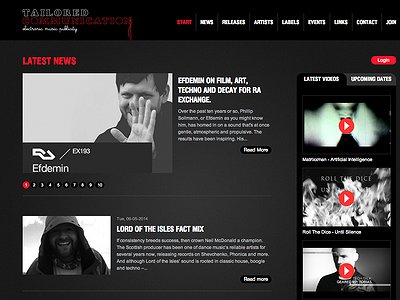What do you usually start with when working on a new campaign?
The music. For an album, we’ll discuss with the label and artist their ideas around the release and how they want us to focus the press approach, as well as putting together an initial list of targets for features, interviews, podcasts and streams where we think the project is likely to appeal. A lot of our artists seem to be anti-press, often having had bad experiences in the past, and we’ll make detailed plans for them, pin-pointing targets, making clear our strategy, what we need from them and giving a general timeline for the promotion. We’ll gather together all the assets for the campaign, usually agree on a news announcement with a particular outlet perhaps with an interview or stream of a track, then begin the main campaign from there slowly spreading the release first through print press, then radio and online.
It can be hard orienting oneself in the current media landscape. From your experience, what are the areas an artist should particularly focus on today? What is a sensible distribution of duties between artists and PR agencies?
Artists need to do as much or as little as they are comfortable with. I really feel that there are no set rules. Social media is a fantastic way of building and connecting with your fan-base and these things work better if they have a personal touch, so I encourage artists to have control of their own social media and allow their personalities to shine through.
There are also plenty of successful artists who don’t do interviews, who don’t have a Soundcloud or Facebook account and the mystery, on the most part, serves them well. Artists should focus on being original artists, it’s ok to completely leave orientation of the media landscape to someone like me, or they can spend half their day arguing with trolls on twitter if that’s really what they like to do!
How would you describe the relationship you have with the media, what are problems and barriers? From your point of view, how should PR and media work together in presenting music to the public?
Good, I hope. I try to be honest, prompt and straight forward in all my dealings with contacts. I don’t force music on people, as I don’t think it ever produces a good end result. The huge turn over of press contacts at some magazines is a challenge. I think everyone should be trying to present the best music they can find, both us and the press. I dislike negative, bitchy, fluffy and highly personal coverage of music - I don’t think it has any place in serious music criticism.
With each artists drawing a highly personal followership, customised campaigns are of vital importance. Could you give us an example of just such an individual approach from your own work and experience, please?
Yes, all artists and labels want different things. Using the Shackleton Fabric campaign of his live mix as an example, Sam didn’t want to do any interviews and he doesn’t allow photographs where you can see his face - so slightly tricky for a strong press campaign! We agreed with the label that to support the release we would do just one online interview and then print features in 4 main territories picking from the cream of the publications - The Wire in the UK (which we got the cover for despite all the photos not showing his face), Groove in Germany, Sound & Recording in Japan and Self-Titled in the USA. Then all the other work was around getting an excellent spread of reviews across the board. We took one Shackleton track from the mix which aired exclusively on Radio 1 and then we gave it away free online to further raise awareness for the release. It was a very simple and effective, concentrated campaign for an excellent release that then topped all the end of year lists.
The results of a campaign are not always easy to measure. How do you define success for your work?
Are we, the artist and label satisfied? Are people appreciating and talking about the music? Sometimes a release just doesn’t get picked up by the press as you would hope…
I once got criticised on Facebook because one of my artists was doing so well that we had blanket coverage for 3 weeks around the release. I took that as a sign of success but it also worried me where the artist could go from there - he’s a massive live act and hugely revered electronic star now, so I think it worked out just fine.
There seem to be two fundamental tendencies in music today: On the one hand, a move towards complete virtualisation, where tracks and albums are merely released as digital files. And, on the other, an even closer union between music, artwork, packaging and physical presentation. Where do you stand between these poles?
I want vinyl, beautiful artwork and something to hold onto. Growing up, the artwork was such an important extension of all the albums I bought, when I only have the digital files I miss that. I think digital is very handy, but it can also devalue the product. You only have to hear some of the crappy music available only through Beatport to believe that it’s become too easy and cheap to make and just whack out as a digital release. There’s also plenty of wonderful music that’s digital only and it makes me sad that this music is confined to digital because the return on vinyl & CD sales no longer means all artists & labels can afford physical releases for anything less than an absolute bomb. But plenty of artists and labels are producing special vinyl or CD only releases and putting all their creativity into these limited run beautifully presented products. All is not lost...
Music-sharing sites and -blogs as well as a flood of releases in general are presenting both listeners and artists with challenging questions. What's your view on the value of music today?
I guess I’ve touched on that just above. Music to me is worth spending money on - and I have always spent the majority of my money on music and going out because that’s my passion. Is the quality lower today because of the ease of digital release? Perhaps not the quality, but there’s so many more releases and that means that digging deep and using your own ears is even more important than before. I have to say I don’t really stream music and don’t use Spotify, although we do use Deezer at home to listen, mostly to Nick Cave albums that we only have on vinyl. So for a while I was missing out on the streaming debate but I’m now firmly on the side of new artists who are not being properly renumerated by Spotify.
One of my artists got only $164 for half a million plays of a track, how can that be right? Also, I don’t think streaming services are wonderful modes of music discovery for most people, there’s so much there and the mainstream is quite overpowering, so I think you often just end up listening to music and artists that you already know.
Please recommend two artists to our readers which you feel deserve their attention.
Exercise One. The Berlin based duo celebrate 10 years together at the end of 2013, with an all new album release and remixes of their back catalogue by friends like Ewan Pearson, Peter van Hoesen, Donato Dozzy and Alex Smoke. Their all-hardware live show is pure techno energy and old-skool dance-floor fun, I highly recommend you check them out.
Lord of the Isles. We first became aware of Lord Of The Isles through his remix of Jon Hopkins earlier this year and have quickly become obsessed with all his productions. Next up are EPs on Permanent Vacation, Phonica and Mule Electronic, with hopefully an album next year.



